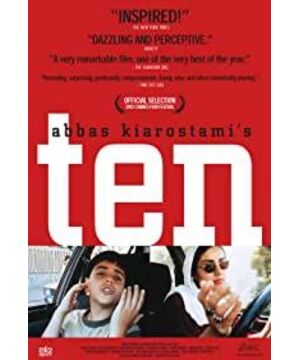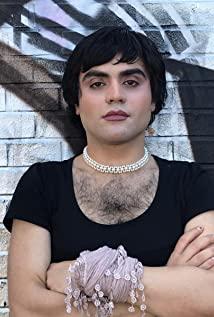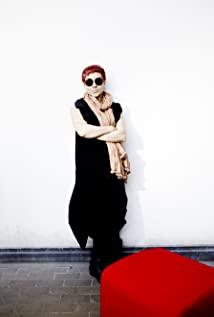Many comments have not commented on the extremely obvious feminism revealed in "10", but constantly emphasized how this film has developed and deepened Abbas’s in the beginning of "Lover under the Olive Tree" and in the beginning of "Cherry Blossom". The "minimalism" developed in "The Taste of Love", and even the scene of talking in the car, is the development and transformation of the so-called "road movie". Form is important, but what is more important is the content carried by the form, if it is not an absolute experimental film or the work of an experimental director. Unfortunately, Abbas is not.
"10" refers to ten conversations between a female taxi driver in Tehran and her passengers in the taxi, including her son, her close girlfriend, an elderly believer, a young woman who is trapped in love, and a prostitute. . The conversation can be divided into three parts. One part is related to the life of the female driver: she is divorced and remarried. She has a precocious son who is about ten years old. The son is in a rebellious youth and is more willing to be with her divorced husband. Her friend has a happy family, but supporting her choice is the object of her confession and the strategist who provides advice. The second part is the story of a young woman who is troubled by love: She thought that the fiance's hesitation before marriage was the "siege effect", but it turned out that she had another love. Finally, she cut off her hair to solve her problem. The third part is about other content: how the elderly believers can find comfort and balance in God and prayer. The prostitute uses likes to explain her behavior and occupation and her unworldly lifestyle.
The feminism that I have learned is a "negative" theory. It only talks about how the patriarchal/male patriarchal society makes women marginalized, and there is no positive attitude of creation to show that it is at least ideal. What the society should be, even if some scholars put forward the "pre-Oedipus stage" or the "image of the earth mother", the overall chaos is still unavoidable. For example, researchers of feminist film believe that movies are a tool for male voyeurism, which is a tool for male voyeurism, to reduce male fear of castration. However, should feminist movies go the other way, putting men on the stage of being pryed up, and making men the object of "watching"? Obviously, discussing feminism in daily life is a more effective and simpler method. Here, Abbas played a trick again, and the category of feminism has advanced from academic theory to daily life.
Children are not wrong, but their views are always faithfully stamped with the brand of society. In "10", there is no adult male on the scene, and the male's point of view is specifically reflected in the 10-year-old son of a female taxi driver. The beginning of the film is a fierce quarrel for about fifteen minutes. The son is unwilling to accept the stepfather, and the mother is very upset about it but can't do anything about it. The mother and son in this passage are in a state of "aphasia" that is incomprehensible to each other. My son is always emphasizing that I am so upset by you that I don't know what to say. Mother is also emphasizing, you will yell and don't know how to listen to other people's views. This kind of "aphasia" is precisely due to the difference between the positions of the two parties: the child is still patriarchal and he cannot accept the mother's remarriage; while the mother is feminist and wants the child to identify with the woman's own choice. The way of communication and communication has made the state of "aphasia" infinitely expanded, becoming a quarrel between men and women. This is a close quarrel, at least we can't see the disadvantages of women, we only know that women's choices have not been accepted.
The sixth and ninth paragraphs are also a dialogue between mother and child. These are two peaceful conversations, and both parties are in a good mood, and the communication is going on more effectively. In the sixth paragraph, the mother receives the child from the husband, but the child asks to go to the grandmother's house, but he does not want the mother to follow along. His mother took him down a road he was not familiar with. The child kept saying that he had gone wrong, where should you take me, but the mother said that he did not go wrong. This is a shortcut. Finally, the child agreed with the mother's point of view and realized that this is a shortcut. The woman proved herself with her own wisdom. In the ninth paragraph of the conversation, the views of women's rights became stronger. The mother and son talked about the current wife of the divorced husband. The child admitted that the stepmother is indeed not as beautiful as the mother, but she prefers the stepmother, because the stepmother can at least guarantee "not to eat the same food every night." Her mother disapproved of this. She laughed at her stepmother that she was only worthy of being a good wife and mother, and that she had to rely on a man to live her life. The image of stepmother in the eyes of children can be said to be the requirements and positioning of women in the traditional patriarchal society. Women are weak and tame, and they should contribute everything to men and families. This view not only exists among adult men, but also directly affects underage men who have left the "mirror stage" through society, making the male and patriarchal discourse that dominate the discourse a truth that seems to be established forever. . The mother’s point of view is a daily feminist point of view. In her eyes, women’s power comes from self-reliance and from resistance to the traditional patriarchal society, although this point of view is also the result of "patriarchy" itself. What is given is to use the logic of the patriarchal society to oppose the patriarchal society, which is a kind of resistance "within the system" and the same discourse system. Compared with the so-called "mother earth" and "pre-Oedipus stage", mothers are more willing to accept and believe that the more effective method is such a "daily" feminist approach.
As far as the importance of each conversation is concerned, the conversation between the female driver and the young woman who is troubled by love is undoubtedly the second place after the conversation with her son. Finally, the young woman took off her headscarf and let the female driver look at her shaved head. At the same time, she said with tears: "This is the first time I shed tears since I shaved." It was the unique climax of such a plain movie.
The young woman was initially in a "fantasy" relationship with this patriarchal society. In imagination, as long as her boyfriend is more brave, they can have a lifetime of happiness. However, reality broke the illusion, and finally she found out that her boyfriend still loved another woman. The huge blow gave her a simple feminist thought. Maybe a woman does not need to live on a man, or maybe she can give up a man who has abandoned her, so she cut her hair to fight against this patriarchal world. After getting in the taxi for the second time, the female driver asked why her headscarf was so tightly wrapped. She said frankly that she had cut her hair, and then unwrapped her scarf to reveal her bald head. The female driver said that it really suits her. The young woman cried, tears streaming down her cheeks, and said that this was the first time she shed tears after cutting her hair. Perhaps, the headscarf is the layers of pressure and constraints that bind women (not only women in the Islamic world). In front of a same sex, untie these layers of disguise, regain your dignity and self-confidence, and express yourself happily and presumptuously. This is also a kind of feminism.
Speaking of it, lesbians have more grounds than gays. Due to the status of women in the patriarchal society, the intimacy of "difficult friends" between women becomes possible. Because of this, many feminist movies have a lesbian color in them, such as Zhang Aijia's "Heartbeat" and her legendary "20, 30, 40". Of course, this is only our view from the logic of the patriarchal world, because although it acknowledges the oppression and restraint of women in the patriarchal society, it undoubtedly puts women in the position of a weak person. Up.
In "10", a feminist film with a simple daily life, women are also captured by faith. The believer carried by the female driver in the third paragraph is a representative of such a woman immersed in faith. This elderly female believer said that she had to go to the mosque every day, and the Lord she prayed for was omnipotent. She even mobilized female drivers to try. Basically, faith is something that transcends gender, so the patriarchal/patriarchal color is not very strong. However, if faith plays a role in anaesthetizing women and obliterating gender consciousness, then its neutrality is very questionable. Abbas seemed to hold this view, so his female driver refused to go to the mosque, but said that she had a lot of things to do.
The most revolutionary woman seems to be the prostitute in the fifth paragraph. She uses a kind of physical pleasure to fight against the patriarchal society. She spoke mockingly about the men who spent the night with her, how they hypocritically lied to his wife in her arms, and told his wife nonchalantly that he loved her. She mocks the chastity and values that female drivers believe in. She does not think that her job is immoral. She even thinks that as long as she is happy, rich, and working with her body, what can't it? This is a character that subverts the patriarchal/patriarchal society, reminiscent of "Dandong and the Prostitute" introduced by Liu Xiaofeng. At least, she upholds her own moral and ethical values. She doesn’t care about the morals, ethics, laws, religions, etc. that belong to the patriarchal society. On the one hand, she finally has her own feelings and on the other hand, her own value. This is the life embraced by this revolutionary woman. manner. However, at best we can call her a hedonist, an Epicurean believer, an individualist, but we cannot call her a feminist, because her attitude is not a female attitude, more It is a philosophy of life with universal colors, which has nothing to do with women and women's rights. Of course, the disadvantage of my statement seems to be that women are not treated as human beings.
Finally, talk about the female driver. This is a complicated female image: for sons, she is a mother and wife; for close friends, she is a confidant; for young women, she is a listener; for believers, she is a preaching object; for a prostitute, she is both like a The teacher is like a student again. But in general, what she conveyed is an everyday feminist viewpoint. As a mother, wife, friend, and savior and educator of her life, she has a spontaneous feminist temperament. And this spontaneous temperament is coming from the social life and social status that women belong to: it comes from women’s reflection on family, love, and affection; it comes from women’s understanding of society, beliefs, and morals; it comes from every bit of life. The stimulus and enlightenment of Dixiaoshi; comes from all kinds of people, viewpoints, and things that you have come into contact with. Such feminism cannot be said to be consciously exploring the status of women in a patriarchal society, nor can it be said to be consciously exploring the social psychology carried by women in a male society. It is not even a system, but just A feeling in life, a small port who is not satisfied with the present/present. Perhaps it can be said that the feminism of daily life is a kind of pragmatic feminism. Regardless of your theory, this kind of doctrine is ultimately beneficial to life, and the result determines the value.
Contrasting with "10" is another female film "Bibo Girl Thief". "Bibo Female Thief" is about four women in a women’s prison forming a band. They took advantage of the opportunity of performing outside to escape. During the process of being chased by the police, they became famous and had countless fans. Finally, after a performance, They were finally shot dead by the police. The feminism in "Bibo Girl Thief" is a pure "negative" feminism, in which the four women in the band are all women who appear in a rebellious identity. In the introduction of the characters at the beginning of the film, we can see that these women are women with inexplicable mania. They are born with a kind of "anger" towards this patriarchal/patriarchal society. A form of confrontation by way of escape/freedom/performance. Even when love came, they took more into account the identity of the female identity, abandoned the handsome man who had been kidnapped, and became loyal to their gender. It can be said that such a feminist film is extremely in line with the ideas of feminists: women are inexhaustible "boring" in a patriarchal society, women escape from the shackles of a patriarchal society, and women The identity of free acting subverts male voyeurism... The four women in the film, like the feminist "mother of the earth", are pure women, carrying the ideals of feminism in a patriarchal society, not Like "10", women's rights are integrated with the entire patriarchal/patriarchal society.
Just as we cannot say which film theory can better guide the filming of films is the more successful film theory, we cannot impose such a pragmatic law on feminism. However, we have to admit that a film that simply explores women's daily life and thoughts is a successful feminist film. After the children's performance of "Where is My Friend's House", the long shots of "Lover under the Olive Tree" and the minimalism of "The Taste of Cherry", we once again admit that Abbas played a smart and conservative Jin's slippery head.
View more about Ten reviews









